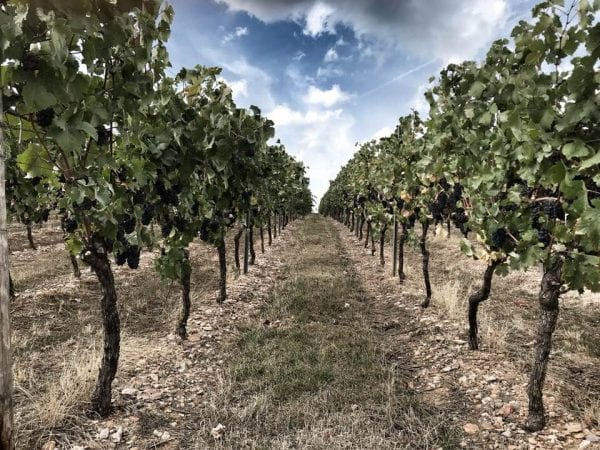 Dear monks, artists, and pilgrims,
Dear monks, artists, and pilgrims,
During this Jubilee year of sabbatical we are revisiting our Monk Manifesto by moving slowly through the Monk in the World retreat materials together every Sunday. Each week will offer new reflections on the theme and every six weeks will introduce a new principle.
Principle 5: I commit to bringing myself fully present to the work I do, whether paid or unpaid, holding a heart of gratitude for the ability to express my gifts in the world in meaningful ways.
Matthew 20:1–16
The Labourers in the Vineyard
‘For the kingdom of heaven is like a landowner who went out early in the morning to hire labourers for his vineyard. After agreeing with the labourers for the usual daily wage, he sent them into his vineyard. When he went out about nine o’clock, he saw others standing idle in the market-place; and he said to them, “You also go into the vineyard, and I will pay you whatever is right.” So they went. When he went out again about noon and about three o’clock, he did the same. And about five o’clock he went out and found others standing around; and he said to them, “Why are you standing here idle all day?” They said to him, “Because no one has hired us.” He said to them, “You also go into the vineyard.” When evening came, the owner of the vineyard said to his manager, “Call the labourers and give them their pay, beginning with the last and then going to the first.” When those hired about five o’clock came, each of them received the usual daily wage. Now when the first came, they thought they would receive more; but each of them also received the usual daily wage. And when they received it, they grumbled against the landowner, saying, “These last worked only one hour, and you have made them equal to us who have borne the burden of the day and the scorching heat.” But he replied to one of them, “Friend, I am doing you no wrong; did you not agree with me for the usual daily wage? Take what belongs to you and go; I choose to give to this last the same as I give to you. Am I not allowed to do what I choose with what belongs to me? Or are you envious because I am generous?” So the last will be first, and the first will be last.’
Background
This parable is one of several Jesus tells shortly after the Transfiguration and just before he enters Jerusalem. Jesus knows his death is near and so has little time left. He is trying to pass along some final lessons while he still has time.
Jesus does this, as he often did, through a story with a setting familiar to his audience and yet ends with a bit of a twist. The set up here is simple enough: a farmer needs help with his harvest and so hires some workers. Most people hearing this story probably are rich enough to own a large enough business as to need to employ a lot of people. However, most of us have experience looking for work.
I’m sure the day labourers chosen at 9am were grateful for the work. They had a full day of physical work ahead, but at least they knew they’d be able to provide for their families because of it. They were probably even grateful for the extra help when more workers were hired at noon, three, and as late as five that evening. And as the parable goes, they were thrilled to see the workers hired last (those who only worked a fraction of the day) were given the full day’s wage. Surely this meant they would be getting paid extra, a bonus for being on the job the entire day.
To say the workers hired first were a bit disappointed in their wages, which they had agreed to work for from the start, is a bit of an understatement. It’s also understandable. As a child, I certainly always related to the frustration of those earlier workers. I was baptised as a child. I attended Mass every Sunday and went to a Catholic grade school. Why shouldn’t I get a nicer heaven than somebody who was leading a wicked life and only gets in with a deathbed-conversion?
Well, because heaven is heaven and being jealous of someone else’s reward (particularly when one is receiving the same reward) is a bit of a jerk move. And as I realised later in life, that the work itself was part of the reward. The workers hired first had the security of knowing they’d be paid that day. The other workers weren’t out living the high-life. They weren’t getting a free snow-day. They had the anxiety of not knowing if they would be able to eat or pay rent.
If my only motivation for doing the work of being a person of faith is a later reward, I am missing out on the blessing of the work itself.
Reflection
My bachelors degree is in education and I was a classroom teacher for twelve years. It was not exactly a 9-to-5 job, but it was a fairly typical job. My classroom was an office, of sorts. I had co-workers. My students were underlings I was responsible for. The parents were similar to customers. And I had several bosses: department chair, dean, vice principals, principals. It also had a regular pay check and decent benefits.
I gave all that up, for better or worse, when I decided to leave classroom teaching because of the curriculum changes dictated by the U.S. Conference of Bishops. I still believe it was the right decision for me. I was able to put behind me a great many frustrations and stresses. But it also created new issues, in terms of income and benefits.
I’m not a proponent of the “everything happens for a reason” philosophy, but this decision did work out very well. I’m now an employee at the Abbey of the Arts which Christine started over a decade ago. I help her with providing Biblical content for our online courses, as well as helping organize and lead our many in-person pilgrimages and retreats.
Not everyone is fortunate to be paid for such meaningful work and so I am extremely grateful for the blessing of the work I have. Others may get paid more or have a larger impact in the world. But I love what I do. I get to work with my wife, doing work we find meaningful, for appreciative and like-minded people.
What work do you find meaningful?
With great and growing love,
John
John Valters Paintner, MTS
Photo © Christine Valters Paintner


